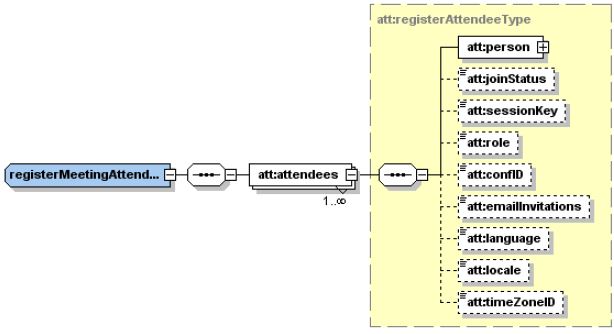RegisterMeetingAttendee
Registers a new attendee to a scheduled session, or accepts or rejects
an invited attendee. When used in conjunction with CreateMeeting orCreateMeetingAttendee, it implements the entire registration process
for Meeting Center, as follows:
- Create a Meeting with registration options turned on, using
CreateMeeting. - Set joinStatus in CreateMeeting or CreateMeetingAttendee to INVITE
to invite attendees to register for the Meeting. - Call RegisterMeetingAttendee to update attendees’ registration
status to REGISTER, ACCEPT, or REJECT.
Note You can choose to send invitation email messages to the
attendees by setting the value of emailInvitations. This setting
overrides the corresponding site and meeting configuration, but it is
only effective for the current session. Currently there are four email
templates that are available for usage. Information on the templates may
be found in 'Email Information'. The XML API will not send a schedule
confirmation email message to the session host even ifemailInvitations is set to TRUE.
Note: Lower Case email address modification
When creating meetings, events, and training sessions as well as
creating or registering meeting attendees, email addresses will be
converted to lower case when saved in the report DB to match with the
URL APIs behavior that converts the email into lower case
Not backward compatible; this may impact the current APP that has
attendee email in mixes case.
Request
The following schema diagram shows the structure of the elements in theregisterMeetingAttendee request message.
Figure 11-10 • Schema diagram for registerMeetingAttendee
Note The expanded diagram for att:person can be found in Figure
G-6.
The sample XML document registers two attendees to a session
whose session key is 13643274.
<?xml version="1.0" encoding="UTF-8"?>
<serv:message xmlns:xsi="http://www.w3.org/2001/XMLSchema-instance"
xmlns:serv="http://www.webex.com/schemas/2002/06/service"
xsi:schemaLocation="http://www.webex.com/schemas/2002/06/service">
<header>
<securityContext>
<webExID>hostid</webExID>
<password>hostpassword</password>
<siteID>0000</siteID>
<partnerID>9999</partnerID>
<email>johnsmith@xyz.com</email>
</securityContext>
</header>
<body>
<bodyContent xsi:type=
"java:com.webex.service.binding.attendee.RegisterMeetingAttendee">
<attendees>
<person>
<name>Bill Gates</name>
<title>title</title>
<company>microsoft</company>
<address>
<addressType>PERSONAL</addressType>
<city>sz</city>
<country>china</country>
</address>
<phones>0</phones>
<email>bill@aaa.com</email>
<notes>notes</notes>
<url>https://</url>
<type>VISITOR</type>
</person>
<joinStatus>REGISTER</joinStatus>
<role>ATTENDEE</role>
<emailInvitations>true</emailInvitations>
<sessionKey>13643274</sessionKey>
</attendees>
<attendees>
<person>
<name>Bill1 Gates</name>
<title>title</title>
<company>microsoft</company>
<address>
<addressType>PERSONAL</addressType>
<city>sz</city>
<country>china</country>
</address>
<phones>0</phones>
<email>billl@aaa.com</email>
<notes>notes</notes>
<url>https://</url>
<type>VISITOR</type>
</person>
<joinStatus>REGISTER</joinStatus>
<role>ATTENDEE</role>
<emailInvitations>true</emailInvitations>
<sessionKey>13643274</sessionKey>
</attendees>
</bodyContent>
</body>
</serv:message>
For descriptions of the global elements in the security context of the
header, see Global Request Elements in Security Context. For
descriptions of the non global elements, refer to “Elements in WebEx XML
Schema Definitions for the Meeting Attendee Service”.
Response
The following schema diagram shows the structure of the elements in theregisterMeetingAttendeeResponse message.
Figure 11-11 • Schema diagram for registerMeetingAttendeeResponse
The sample XML document shows an example of a possible response to the
preceding request document.
<?xml version="1.0" encoding="UTF-8"?>
<serv:message xmlns:serv="http://www.webex.com/schemas/2002/06/service"
xmlns:com="http://www.webex.com/schemas/2002/06/common"
xmlns:att="http://www.webex.com/schemas/2002/06/service/attendee">
<serv:header>
<serv:response>
<serv:result>SUCCESS</serv:result>
<serv:gsbStatus>BACKUP</serv:gsbStatus>
</serv:response>
</serv:header>
<serv:body>
<serv:bodyContent xsi:type="att:registerMeetingAttendeeResponse"
xmlns:xsi="http://www.w3.org/2001/XMLSchema-instance">
<att:register>
<att:attendeeID>143147</att:attendeeID>
<att:registerID>189613</att:registerID>
</att:register>
<att:register>
<att:attendeeID>143152</att:attendeeID>
<att:registerID>315556</att:registerID>
</att:register>
</serv:bodyContent>
</serv:body>
</serv:message>
The result and exceptionID global elements allow you to confirm that an
instantiation request was successful. These elements are described in
“Global Response Elements Showing Results and Errors”.

